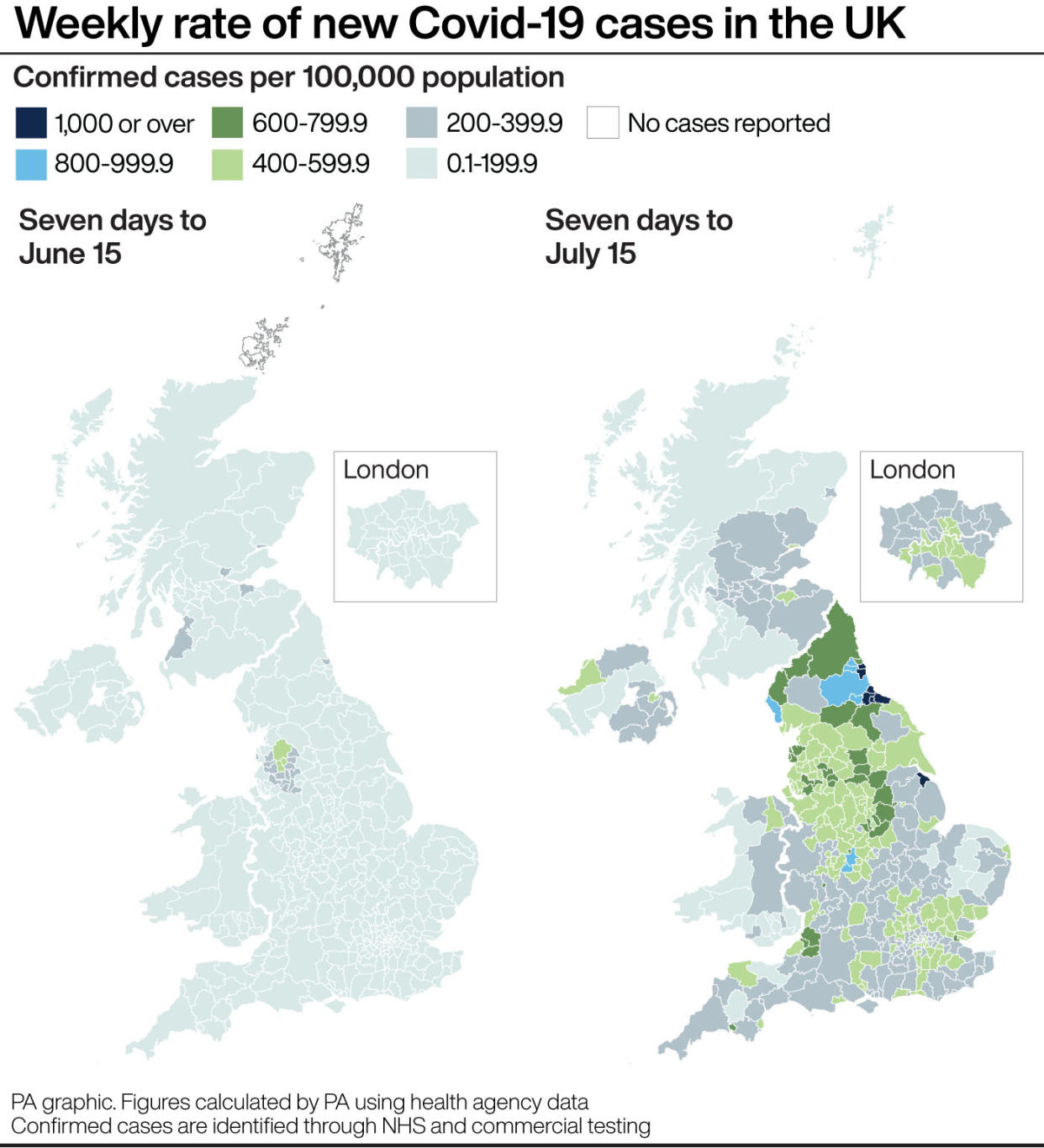When will we know the impact of 'Freedom Day' on England's COVID rates?

Coronavirus case numbers and then hospitalisations will increase over the next three weeks as a result of England’s ‘Freedom Day’, the country’s deputy chief medical officer has said.
Professor Jonathan Van-Tam said the impact of lifting almost all COVID-19 restrictions will be felt in terms of a rise in cases in the next seven to 10 days.
This will be followed by a knock-on effect on the number of people being admitted to hospital with coronavirus in the seven to 10 days that follow that.
England’s restrictions were lifted on Monday, as nightclubs were allowed to reopen, social gatherings restrictions were dropped and face masks are no longer a legal requirement.
Prof Van-Tam said: “All the predictions are that if cases continue to rise there will be increased pressure on hospitals, and what the NHS has in front of it now is not only dealing with these new hospitalisations, but also dealing with the catch-up of other care that it needs to.”

He added if hospitals in England find themselves back in a situation where they are overwhelmed, it would “absolutely” be considered by the government’s Scientific Advisory Group for Emergencies (Sage).
“What puts the pressure back on is close contact indoors,” he said. “Going into the summer when many of the things we like doing can be done outdoors is probably a good place to be right now.”
After going past the 50,000 cases per day mark at the end of last week, a further 39,950 were recorded on Monday, although numbers are usually lower at the start of the week because of reporting delays.
Watch: Nightclubs open their doors at midnight on England's 'Freedom Day'
According to the latest government data, 742 COVID-19 patients were admitted to hospital in the UK on 13 July, meaning there were 4,094 patients in hospital on that date.
Scientists have expressed fears that there will be 200,000 coronavirus cases per day later this summer.
Prof Van-Tam said the uncertainty over the next peak of coronavirus would be “driven by human behaviour over the next four to six weeks”.
He said: “It is kind of in everybody’s hands, yours and mine.

“If we are gradual and cautious, and we don’t tear the pants out of this just because we’re glad to have our full freedoms back, then we will materially affect the size and shape of the remainder of this epidemic curve and where the peak occurs, and how big it is.
“It is literally in the hands of the public, in terms of the behaviours.”
The government’s chief scientific adviser, Sir Patrick Vallance, said: “Most of the models are suggesting that there should be a peak and start seeing some sort of either plateau or decrease over August.

“And at that point, if things continue to increase at the rate they are – and there is something like 50,000 or near 50,000 cases per day at the moment being detected – with a doubling time of 11 days, you can see that that gets to pretty high numbers very quickly.
“And another doubling time will take you to even higher numbers, of course – that would be really quite, quite worrying.”
Johnson has been criticised for announcing on Monday that, from the end of September, entry to nightclubs and other venues with large crowds will be dependent on customers having had two COVID-19 jabs.
Sir Patrick said nightclubs had the potential to cause “super spreading events”.
Prof Van-Tam acknowledged the sacrifices made by young people during the pandemic, including the lengthy lockdown of nightclubs.
He said: “They have made sacrifices in terms of the kind of social interactions they can have and in terms of the relationships they can be building at a time when young people want to, and have the absolute right to, build relations for the future.
“So I completely sympathise with that.
“On the science side, however, it is a case in point that if you pack my garden shed full of people and they are unvaccinated, the likelihood of transmission is going to be far greater than if you pack my garden shed full of people who have been fully vaccinated and are 14 days out the other side of their second dose.
“It will not reduce the risks to zero – nothing reduces the risks to zero other than standing in a meadow completely on your own ad infinitum with nobody coming within three metres of you.”
Watch: Boris Johnson says vaccine passports for nightclubs required by end of September


